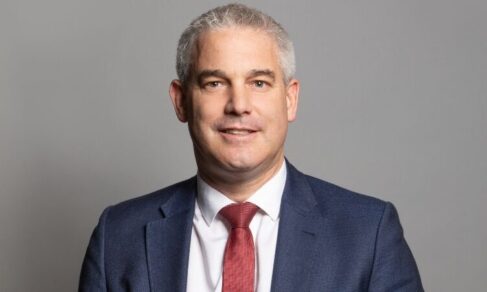Health secretary ‘courting controversy’ at expense of care, says RCN

The Royal College of Nursing (RCN) has accused health secretary Steve Barclay of playing politics and ignoring serious staffing issues in his speech at the Conservative Party Conference.
During his address this week in Manchester, Mr Barclay announced plans to change the NHS constitution, following a consultation later this year, ‘to make sure we respect the privacy, dignity and safety of all patients, recognise the importance of different biological needs and protect the rights of women’.
Mr Barclay said change in the NHS required ‘a relentless focus on patient outcomes’, which ‘does not mean ignoring patient’s voices, especially women’s voices when it comes to the importance of biological sex in healthcare’.
The health secretary added: ‘I know as Conservatives, we know what a woman is and I know the vast majority of hardworking NHS staff and patients do too.
‘That is why I ordered a reversal of unacceptable changes to the NHS website that erased references to women for conditions such as cervical cancer and stopped the NHS from ordering staff to declare pronouns to each new patient.’
Related Article: New preceptorship package for social care nurses
In response to the speech, Professor Nicola Ranger, RCN chief nurse, said: ‘The health secretary should not play politics and court controversy at the expense of people’s health and good care, including plans that can actively deter trans individuals from accessing services.’
Professor Ranger also expressed disappointment that the health secretary’s speech failed to address the issue of nursing vacancies.
‘The single factor that has the greatest impact on the quality of your care and your experience as a patient is the number of staff on duty, but things are heading in the wrong direction,’ she said.
‘Record numbers of unfilled nurse jobs are detrimental to good care. The number of students starting nurse courses in recent weeks has fallen again and too many experienced nurses are considering leaving intolerable workplaces,’ Professor Ranger added.
In August, it was revealed that the number of vacant nursing positions in the NHS had increased by 3,243 between March and June, taking the total to 43,339. This was in spite of a nursing recruitment drive launched by NHS England in October 2022.
Sir Julian Hartley, chief executive of NHS Providers, also expressed concerns over the health secretary’s speech, commenting that ‘any proposed changes to the NHS constitution should have improving inclusivity at the heart of what they do and be subject to wide conversations and consultation’.
Sir Hartley said that social care needs ‘radical reform, sufficient funding and more support to ease pressure on stretched NHS services’.
Related Article: Applications to study nursing in England at ‘new low’
He added that the NHS requires ‘more investment in the wellbeing and working environments of NHS workers to help to keep and attract much-needed staff’.
The health secretary also used his speech to announce the creation of a new £30m fund to ‘speed up’ the adoption of technology in the NHS.
‘This will enable clinicians to adopt proven technology that can improve patient care,’ he said.
‘These could include new tools to detect cancer sooner, to help people receive treatment in their own home or increase productivity to tackle waiting lists.’
Mr Barclay said projects will be delivered in this financial year, ‘getting benefits to patients as quickly as possible’.
Related Article: Paul Rees appointed as permanent NMC chief executive and registrar
The health secretary also highlighted the use of AI to speed up brain scans, as well as an ‘upgrade’ of the NHS to offer patients a choice of up to five different healthcare providers – including independent providers – following a GP referral.
Sir Hartley of NHS Providers commented: ‘Health service leaders are committed to using the latest hi-tech equipment to improve results and patient safety.
‘An NHS fit for the future needs the right investment in capital and day-to-day running costs to boost productivity and improve the safety and experiences of patients and staff.’

See how our symptom tool can help you make better sense of patient presentations
Click here to search a symptom




